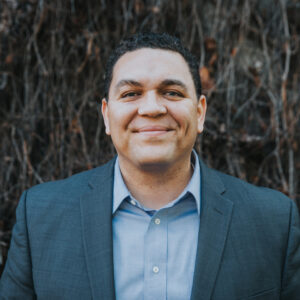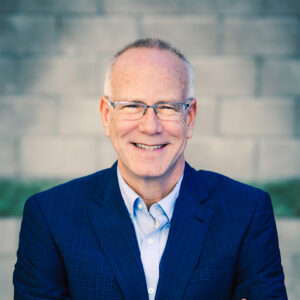Theology and Practice: Empowering Women at Work
Mark: We were asked by some really strong, competent women to have this conversation about women, work, and church and how we contribute to their flourishing. My first question is, when Meggie said, “Hey, would you participate in this conversation,” what did you think?
Marcos: For me, I first think of my grandma who was a single mom and had three jobs in Peru. She was a teacher, so she would do the morning shift, the afternoon shift, and the night shift in three different schools …
Mark: Wow.
Marcos: And she carried my mom and her three siblings forward in life and the way in which she intersected her faith in that job setting was just powerful. She was never necessarily called to ministry but the ministry that she did of was one of hospitality. There were always tons of people at our house. There are always people that attest to her hospitality and to her help.
I think most of us could trace it back to a family member that actually led our family in one way or the other. Most of the time, at least in our Latino culture, we would think of a woman, whether it is Grandma, Mom, or Tia (Aunt)–courageous women that have actually helped the Latino community to survive and thrive even in the face of the most difficult situations.
I think of the way in which my grandma embodied both that resilience that a lot of Latina women teach us and also a captivating faith that inspires everything that they do. I think that it’s one of the greatest and often overlooked resources of spirituality that our community has.
Mark: Sounds like part of your understanding of women in leadership comes out of your personal experience and your growing up. What if somebody in your church setting comes to you and says, “Hey, wait, the Bible doesn’t approve of that, what you just said. That’s not biblical.” Now you want to respond in a minute or two in a way that is not going to slam the person. What would you say?

Peter Rios, CEO, RIOS consulting
Peter: It’s about teaching. We have to have the patience to walk with somebody because it’s going to take some time. People don’t change their doctrines or form ways of thinking overnight. What I try to do is always take them back to Jesus. Jesus told his disciples that they were not to lord [their faith] over anybody, meaning that no one has any right to be the boss of anyone because if Jesus is at the center, then that’s who regulates and directs our life.
We have women in leadership from the Old Testament to the New that most men historically have never preached or taught because, let’s be very honest, it’s always about power. Power and privilege. That is something that as men, we have taken upon ourselves and has never been given to us by God in my opinion, in my biblical understanding. We have assumed that power but it has never been given to us by God. We have to go in scripture and then do a self-analysis.
I think we have to be able to humble ourselves to see that everyone is invited at the table—whether male or female, no matter your culture or your socioeconomic status, because that’s what I think God delights in.
For me, my cross-cultural, counter-cultural test was with my wife. When my wife and I were dating and I told her I was studying theology, and she said, “Oh, I study God, too.” I’m like, “You’re in science, you don’t study God.” She says, “Yes I do!” She began to tell me how she studied God through creation, through science. I never thought of it like that. It was exposure, you see, being exposed to a different outlook. Then as we got married, I began to see how God wired her and God gifted her, and how she was very smart—in some areas brighter than me. God had put us side by side to complement and help one another.
Marcos: I think another challenge that comes especially within our context is that Spanish is a gender-specific language. Even reading some of the passages where women are leaders, evangelizers, et. cetera are not only laden with history of interpretation over centuries of Christian history, but it also with gender-specific language that has prioritized the masculine over the feminine. That creates a little bit more work for us leaders to be able to peel layer after layer back of why this was interpreted in such a way.
Mark: That’s a great point. You’re right, that’s not what we pick up in English.
You both want to be supportive and encouraging of women discovering their gifts and using them, whether it’s in the church or in the family or in the marketplace. In a practical way, what are some of the things you do as a pastor? What are some of the things that you’re committed to doing to help really support, encourage, open up the door for women?

Marcos Canales, Pastor, La Fuente Ministries
Marcos: I would say mentorship, space, and trust.
In terms of a mentorship, knowing that I can’t be their mentor so asking them to be mentored by other women of color is of utmost priority. Knowing my limitations as a male of color means I can only go so far. From then on the question is, who is mentoring you and walking with you, because there is stuff that I don’t get.
Second, space—Both in terms of what people see on Sunday mornings but also in terms of the space for women pastors in our congregation to set what they’re good at and to give them that space to thrive. Right now, we are so gifted to have a female worship pastor and that’s her calling. We also have an associate pastor and her gifting is administration and logistics and all of that. Knowing my limitation and saying, I’m not good in any of those, so please. Here is the space to make it your own and we are behind you and we trust you. If it’s a win, we will celebrate together. If it didn’t go out as planned, then we all take the hit for it and let’s think through what this is going to mean as we move forward.
Part of it is talking about titles, too. For me to call them “pastor” in Spanish—again, it’s gender specific—to say Pastora Rosa and Pastora Jennifer, it already changes people’s narratives. These women are just as much pastors as I am and we are a pastoral team. That’s why I also don’t use the term senior pastor because then that creates hierarchy.

Mark Roberts, Executive Director, De Pree Center
Mark: Yeah, that’s right on. Several times you said something like, “I don’t get that or I don’t understand that,” so there is a recognition that there are things that you as a man are not going to get. That’s part of the humility, right? I’ve grown up in a culture where it’s hard for me to say that. But the more that I can say that, there is freedom to learn from others. That’s one thing that struck me.
The other thing that struck me was, in your last examples about language and titles, you have been given power and authority, but you’re using it so that others might be empowered. It’s not saying you’re bad because you have power, you should get rid of your power. No. You need to use that power, and you can use that to be empowering others. You’re doing so thoughtfully which is just right on.
Marcos: Thank you. When people have questions about how our leadership works and how shared power works and all that, I always say, if Latina women stop coming to church, the church falls apart. The Latino church cannot survive if Latina women …
Peter: The church overall is primarily women.
Marcos: From my perspective, that is a backbone of the ecclesial life. For too long we have been playing into the politics of gender, especially by looking at the modern, westernized concept that men have minds and women are only bodies. When you play into that dichotomy in church life, it’s not only sinful but it’s actually co-opting people’s minds to also think that the Kingdom of God plays under those binaries.
Mark: Peter, how about you?
Peter: I think if we can have more of a Trinitarian view of relationship, it will help us to then share that influence, that power, and I’m talking about mutually women and men. The father isn’t over the son, the son isn’t over the spirit, the spirit isn’t over either. They work together. It’s called perichoresis. They’re in a circle dance. They work together. They mutually send one another. They mutually serve one another. They mutually empower the church. I think that that’s a good start for us theologically and then it goes back to historically.
Marcos: Specifically in the particular context of Latino culture, we have a lot of women who are the head of households. Behind closed doors, everybody knows that, but in public, there is still this narrative that the man is in charge. That dissonance actually creates more of a disorienting experience for the younger generation. Then they say, “This is not who Jesus is. This is not what we find in scripture, so I’m out.” That disillusionment, if we are not more aware of the impact, it could have long-lasting effects.
Mark: Yes. I notice that both you guys, many times in this conversation, you point to Jesus, you point to God and the nature of God. Again, that’s what we ought to do as Christians, but this comes with a lot of authenticity.
At the same time, you’re both speaking out of the current context and the need of the church to connect with where people are and to be creating a model of relationships that will speak to people today. You talk about the next generation. I appreciate the combination in both of you.
A question I have for you then: If you were going to say something to women to be a word of encouragement, what would you say? Let’s suppose a younger woman in your congregation comes to you and says, “I don’t know about all this stuff. Could I be a pastor? Could I be a leader of a business? How can I know?” What would you say?
Peter: Yes. Do it.
Marcos: We’ll be here encouraging you for whatever that dream and vision is.
Peter: And pair up the person with someone who is already doing something similar. If a woman came to me and said, “I really want to start my own business,” I would probably ask, “In what?” If I can help and be of service, I would.
I think that everybody around this table is here because someone else took time to mentor them. Discipleship is huge and we can disciple in the marketplace as well. I think that pairing somebody up, encouraging them, being accountable and showing them that we care is huge. And having the community be involved, whether it’s in the corporate world or in the church. I think that is huge.
Marcos: I would say also, the church needs you more than you need us. We need them so I would be asking, “What are the obstacles right now in your way that we can help remove so your dream can become a reality?”
Also, we don’t want to tax those individuals in thinking, “Okay, you started a new business, but don’t forget to come to church and do all these things,” but rather start saying, “This is your ministry.” So in the discipleship piece, whether it be missional language or just a robust theology of work, that can actually free them up to see the intersection of both faith and work as a unifying, life-giving aspect of their discipleship.
Mark: Awesome. Flip sides. What do you want to say to men to help women become fully who they are in Christ?
Peter: Get out the way.
Marcos: Yeah, pretty much.
Peter: Yeah. Just ask the Lord to encounter you and help you in this area if you struggle and know that it’s normal to struggle. Most of us have been raised with the narrative that we are supposed to be in charge or supposed to lead, and some of that is true but it’s also contextual. We need to learn that God created male and female both equal, so it’s always going to be some type of contention or struggle because we are in a sinful world and we are fallen.
That’s why community is so important and is so being accountable—asking people for help and reorienting yourself in Scripture. If you don’t yet believe like this or haven’t come fully on board, maybe ask someone who is. Maybe you can talk some things out, pray through it, do some studying, expose yourself to women who are actually in leadership and doing it well. See what you can learn.
Marcos: I would say in line with that as men are doing self-reflection, as yourself, “what are you afraid to lose? What’s at stake that you’re wanting to hold onto?” Once we can answer that, then we can be honest with what’s really at stake. That’s the deeper issue: what are you afraid to lose if women are in your leadership position?
Mark: I’d like to end with this question. We’ve talked about women in church, family and in the marketplace, but especially in terms of how the church can encourage women in the marketplace to discover and use all of their gifts and to flourish in their work. Any thoughts on how we can do that well as men?
Peter: I think as a society, we’ve been very hard on women, expecting women to be the home manager. While I know many women want to be a mom or want to have children, I think most who have been exposed to any type of leadership opportunity also see themselves doing that or creating an opportunity for themselves, and they have the aspiration and ambition and are highly talented and gifted by God to do it. So I think women in general may carry that ambivalence of, “Okay, I want to be a professional and I want to be a leader, but I’m also pressured to be a mom and be at home. And besides that, there is this glass ceiling in the corporate office that doesn’t let me rise above that.”
I think that what we can do is probably encourage these women to go for their dreams they to help them with any resource they would need because they have what it takes. I know a lot of women who are establishing the Kingdom as a lawyer, as a doctor, as a scientist, outside the four walls of the ecclesial building, so we have to encourage them that they are more than what the prominent society says that they are.
Marcos: I would say that, first of all, if anybody listening is in charge of hiring in the marketplace that they make sure that they are hiring with equal pay. That’s not a liberal agenda or a progressive agenda. It’s just a biblical mandate of generosity and reciprocity for work, so I think that probably has to be in the top of the priorities.
Secondly, I think most of our conversation has still been based as to what we as men can do, but I think women have to set the agenda for that, so listening would be a huge step.
We especially need to listen to women of color in the marketplace because they are the ones that are going to school; they are the ones that are getting trained. In the next few years, it’s not only going to be a more diversified nation, it’s going to be also a more woman-led nation, and so we need to catch up.
I think that there are layers of discrimination with women, specifically women of color. It’s a huge aspect, the myth of the stereotypes of each of the women. Latino women are sexy, right? Black women are angry, right? All these kinds of things play such a huge role in our racialized society that is counterproductive to the gospel and to the Kingdom.
Mark: Awesome. Again, you’re both doing what I said earlier, which is on the one hand there is biblical truth about who we are created to be and who Christ has redeemed us to be and that’s the theological base. Then there is the practical element from our experiences, which command this greater inclusivity.
What I appreciate about both of you is there is lots of wisdom but also your humility in this. You both talked about how important that is but I think you modeled that, too.
Thanks for the time. This has been a great conversation.
Peter: Thank you.
Marcos: Thank you so much.



